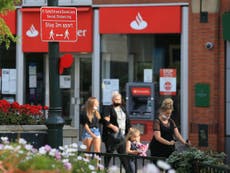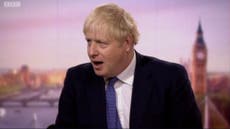Coronavirus: Boris Johnson says 'too early to say' if local lockdowns are working
Prime minister recognises public ‘fatigue’ with restrictions on their lives
Your support helps us to tell the story
From reproductive rights to climate change to Big Tech, The Independent is on the ground when the story is developing. Whether it's investigating the financials of Elon Musk's pro-Trump PAC or producing our latest documentary, 'The A Word', which shines a light on the American women fighting for reproductive rights, we know how important it is to parse out the facts from the messaging.
At such a critical moment in US history, we need reporters on the ground. Your donation allows us to keep sending journalists to speak to both sides of the story.
The Independent is trusted by Americans across the entire political spectrum. And unlike many other quality news outlets, we choose not to lock Americans out of our reporting and analysis with paywalls. We believe quality journalism should be available to everyone, paid for by those who can afford it.
Your support makes all the difference.Boris Johnson has said it is too early to say whether local lockdown restrictions are working, telling BBC1’s Andrew Marr Show: “We have to to wait and see whether the rate of infection starts to come down.”
Mr Johnson was speaking amid growing public frustration over localised restrictions which have remained in place in some cases for months without ridding areas of a second wave of coronavirus, and which now cover around one-third of the population.
Greater Manchester mayor Andy Burnham warned that the government is “in danger of losing the public in the north of England”.
In Greater Manchester, where residents are banned from visiting one another’s homes, infection rates have increased from around 20 per 100,000 population when local restrictions were imposed in July to over 200 now.
Mr Johnson said he recognised public “fatigue" with limits placed on their social and economic lives and realised that people were “furious” with him and the government.
But he said that, in the case of places like Oldham, which has been under local restrictions for six weeks while infection rates have doubled, it was necessary to allow time to see whether the retransmission rate - known as R - starts to reduce in response to changes in behaviour.
Asked whether restrictions in the northwestern town were working, he said: “I’m afraid it's simply too early to say.
"Of course I know it's deeply frustrating for people in Oldham and for businesses in Oldham to be labouring under the kind of restrictions that we've got.
"But the advice that we're getting is that in these areas where we've got local lockdown - stringent local lockdowns - we need to wait and see whether the R starts to come down.
“Some of these things have been intensified and the ratchet, as it were, has been tightened just in the last few days, so you've got to wait and see whether the rate of infection starts to come down.”
Mr Johnson said: “I appreciate the fatigue that people are experiencing, but we have to work together, follow the guidance and get the virus down, whilst keeping the economy moving. That's the balance.”
Asked why months of additional local restrictions had failed to get the infection rate down in Manchester, the PM replied: “I think that there are there are all sorts of factors in play, and clearly what's happened is that we put a lot more load back onto the risk factor, in the sense that we've got schools back, we've got businesses back, things are moving again in a way that they weren't during the lockdown of March and April.
“But we've also managed to keep hospital admissions much, much lower than they were during that period, we've managed to keep the death rate down, although obviously we have to make sure that we keep it down.
“The balance is, how do you ensure that places across the country continue to fight the virus effectively whilst keeping the economy moving.
“The way to do, the most important thing is to remember the guidance - hands, face, space, get a test if you think you have it, rule of six. Those are the crucial things, and also bear in mind that this otherwise blissfully freedom-loving Conservative government has imposed measures that would amount to serious fines if you fail to comply.”
Speaking to the Sophy Ridge On Sunday show on Sky News, Mr Burnham said: “We need a bit of a reset here so that people can clearly understand what’s being asked.”
He added: “I certainly feel this week that we’ve reached a bit of a turning point with all of this.
“The Government are really in danger of losing the public in the North of England.
“And actually if they carry on imposing restrictions on the North without proper support for the businesses and the employees affected in the North, we will see a winter of levelling down and the North-South divide getting bigger.”
Shadow health secretary Jonathan Ashworth said the Government’s approach to local lockdowns raised suspicions of political interference – because seats with Tory ministers appeared to be spared the toughest measures.
He told the Marr Show: “What we need to see is local authority leaders properly involved, we need to see local councillors properly involved, we need to see the local health service involved as well.”
At the moment it was “not clear why” areas were given extra restrictions, because some areas with higher case rates – such as housing secretary Robert Jenrick’s Newark and chief whip Mark Spencer’s Sherwood – do not have restrictions.
“Because there is no clear guidelines as to why an area goes into restrictions and how an area comes out of restrictions then there is a suspicion that there is political interference – I hope there isn’t,” he said.
“But until the government publish clear guidelines, that suspicion will always linger.”





Join our commenting forum
Join thought-provoking conversations, follow other Independent readers and see their replies
Comments